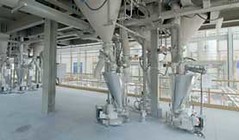Increasing recycled material used in compounds while maximising quality
This white paper by German firm Coperion looks at the current state of the technology involved, including technical challenges in production, and explains why better results can be achieved in many recycling applications by using twin-screw extruders instead of single-screw extruders.
The plastics industry has to produce more sustainably to match the needs of end users’ changing consumption behaviour and stringent environmental legislation worldwide. Recycling plays a key role in achieving this goal. Many plastics processing operations are facing the question of how to implement recycling on an industrial scale at the highest quality.
There are solutions that will allow the plastics industry to efficiently recycle – from pneumatically conveying the receipt of raw materials to feeding, compounding, pelletising, and conveying end products – and can increase the quality of recyclate-based compounds across the entire manufacturing process.
The fact that packaging can be recycled is still far from guaranteed. Factors ranging from product design to collection, sorting and processing ensure plastic recyclability. Many companies that want to use recycled material in processing plastic lack the necessary technical knowledge and appropriate machinery to increase the proportion of recyclates used.
This white paper provides information about the necessary prerequisites and technical procedures to increase the percentage of recycled material in products and to improve the quality of compounds made from secondary raw materials in the process.
Recyclate and quality go hand in hand
Plastic waste must be easy to recycle, and the final product must also meet customer requirements. That said, the areas of greatest importance are feeding, compounding, pelletising, and conveying.

Before recyclate processing, the waste plastic is broken down, cleaned, and then separated according to type. The generated regrind and ground product can be delivered via conveying lines and feeders, together with other recipe components, to the compounding process.
Meanwhile, differentiating between primary and secondary materials is important during feeding. Like any recycling material, waste plastics are heterogeneous in size, form and bulk density.
Single-screw extruders are operated primarily using volumetric feeders, which are only suited for feeding bulk materials with consistent density; whilst twin-screw extruders are usually operated with gravimetric feeders, which operate far more precisely and, thanks to the weight signal, can react better to fluctuations in bulk density and material flow. Moreover, their feeding performance is precisely documented.
Application determines the technology
Coperion K-Tron offers weigh belt, vibratory and screw feeders, and more to provide decision makers an appropriate feeding technology solution that is technically suitable, as well as time and economically efficient in terms of investment and operation.

Weigh belt feeders are reliable, gravimetric feeders that offer high precision and efficient process control. They can feed large volumes of bulk material and materials with varying flow properties, since they weigh the bulk material prior to discharge and actively adapt belt speed. As such, the Coperion K-Tron Smart Weigh Belt feeders are suited for processing recyclates with fluctuating bulk density.
Vibratory feeders are suitable for feeding smaller recyclates or flakes, or adding glass fibre into compounding processes. These maintenance-free feeders are available in various sizes with a selection of tray configurations that are appropriate for the application, and for conveying a wide range of bulk materials.
Twin-screw feeders are implemented at a later point in time along the value chain, for example, in compounding. Here, the technology distinguishes itself through the precise feeding of finer bulk materials, which is primarily suitable for additives. The high precision of the corresponding weighing technology and precise control algorithms enable additional materials to be fed precisely into the process according to the recipe, and the end product’s quality is constantly optimised.
Complete feeding systems
Coperion K-Tron offers other components alongside the feeder types, including bulk solid pumps, liquid feeders and mixing stations.
In compounding, the screw melts the raw materials and mixes them. The melt is devolatilised and conveyed toward the discharge. Usually, material is fed continuously to the screw via feeders and hoppers from above

With the general trend towards rising throughputs, however, the fact that single-screw extruders are fed volumetrically limits their processing capacity. Moreover, a problem is encountered in processing waste plastics: single-screw extruders exhibit relatively low dispersion and devolatilisation output. Depending on the available raw material, this can lead to inadequate compound quality. If the secondary feedstock is too heterogeneous, then the recyclate percentage should be reduced or 100% primary feedstock should be used.
Twin-screw extruders Increase compound quality
Coperion offers two different twin-screw extruder series: the high-end ZSK type and the STS series. For both series, feeding of additives, filler and reinforcing materials into the process section takes place using feeders.
With the extruders’ high torque and optimally adjusted process parameters, high percentages of calcium carbonate, talc, glass or natural fibres can be processed.
Homogenisation and devolatilisation take place, with markedly higher intensity than with the single-screw extruder. Odours that may be present in the secondary raw material are effectively removed. Using the twin-screw extruder, compounds with the precise characteristic profile specified by the customer can be manufactured at a constant high level of quality.
In the same token, solutions are available If devolatilisation or deodorisation of the end product is required for safety, odour reduction or increase in quality. Be it product cleaning, heating, or cooling, Coperion can offer users all process steps under one roof.
This technology can be implemented for various applications in the manufacture of recycled plastics: for regrinding of plastics such as HDPE, PP, ABS, PS and PVC, manufacturing films, PET recycling; and upcycling of various materials, which is highly demanded by compounders. To be profitable, generated pellets must be of consistent and high quality in accordance with the specifications and quantities required.
Read full article...
(PRA) Subscribe to Get the Latest Updates from PRA Please click here
©2021 Plastics and Rubber Asia. All rights reserved.

©2020 Plastics and Rubber Asia. All rights reserved.
Home Terms & Conditions Privacy Policy Webmail Site Map About Us
















